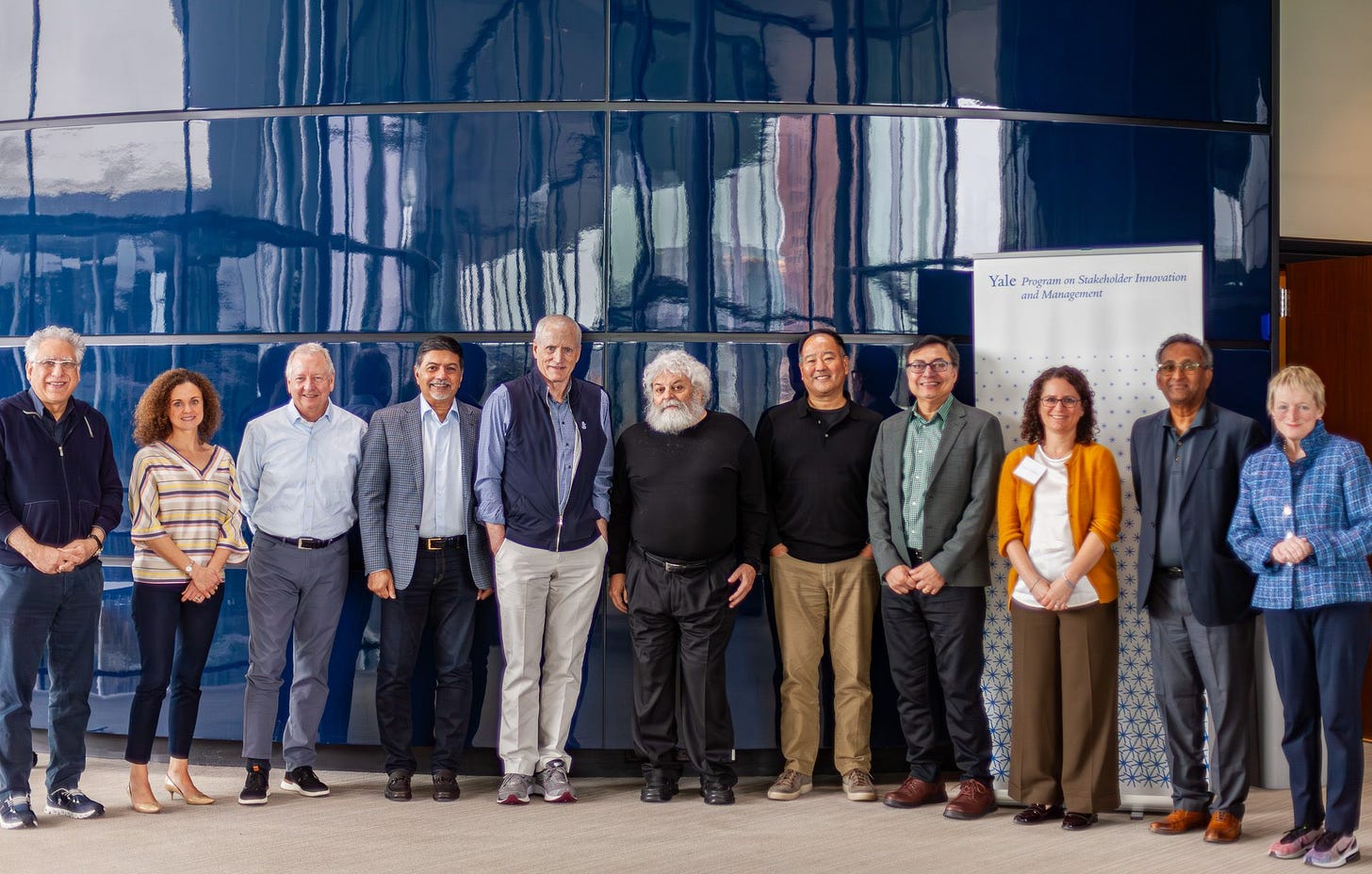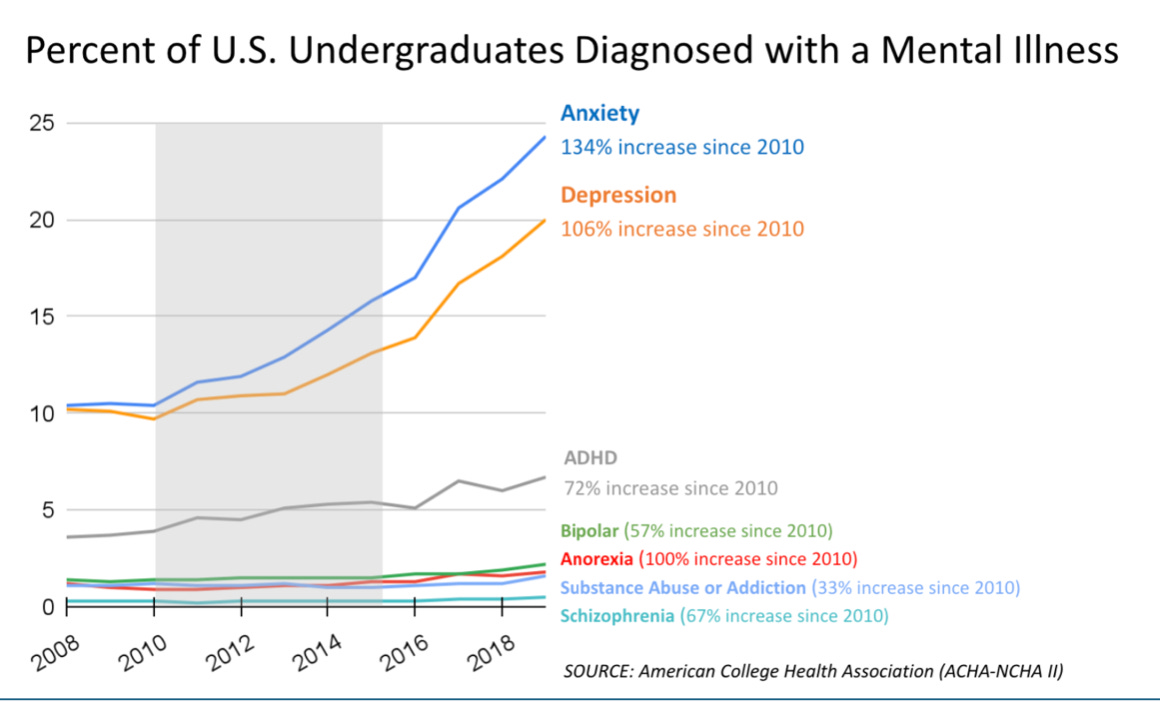If you want a guarantee, buy a refrigerator!
Apr 25, 2024The concept of purpose has been having quite a moment – from books heralding its importance to claims that it holds the key to the hearts and minds of Gen Z workers to claims from consultants that we can “unleash the power of organizational purpose to transform productivity and profitability.” But how exactly should we be thinking about this?

The Purpose and Values Academic Camp, sponsored by the Yale Program on Stakeholder Innovation and Management
It was really fascinating to join colleagues from different institutions with different perspectives to reflect on the current state of the art of corporate purpose, from initial definitions to empirical results. The cast of characters was impressive:
-
Jon Iwata, Practice Leader of the Yale Program on Stakeholder Innovation and Management and a long-time IBM SVP and Chief Brand Officer (“All jokes about IBM are true!”);
-
Ted Snyder, Professor of Economics and Management, Yale, Former Dean of Yale School of Management (our fearless timekeeper).
-
R. Ed Freeman, Professor and Academic Director, Business Roundtable Institute for Corporate Ethics, the Darden School, University of Virginia (says he gets too much credit for inventing stakeholder theory but that he’s now old enough to simply accept it!).
-
Colin Mayer, Emeritus Professor of Management Studies, Said Business School, university of Oxford (“corporations are psychopathic in terms of the way in which they exploit at the expense of others”).
-
Raj Sisodia, FEMSA Professor and Chairman of the Conscious Enterprise Center, Tecnologico de Monterrey (many books including Conscious Capitalism – to watch my Fireside chat with his co-author, click here).
-
CB Bhattacharya, H. J. Zoffer Chair, Katz Graduate School of Business, University of Pittsburg (book – Small Actions, Big Difference).
-
Claudine Gartenberg, Associate Professor of Management, Wharton School, University of Pennsylvania (she joined this conference as an Assistant Professor and got the news from Dean Erica James that she was being promoted just that morning!).
-
Charles Dhanaraj, J. Mack Robinson Professor of International Business and Academic Director of the DBA program, Robinson College of Business, Georgia State University (just joined, moving from Denver recently).
-
Ravi Dhar, George Rogers Clark Professor of Management and Marketing & Director of the Yale Center for Customer Insights, was our fearless organizer, together with his team.
The Yale folks are going to provide summaries of the various talks, so I’m just going to offer some nuggets that I found particularly interesting here.
When do organizations tend to lean into purpose?
Jon Iwata and Ted Snyder conducted dozens of interviews with CEO’s and other enterprise leaders. One finding I thought was particularly interesting was that organizational leaders tend to emphasize purpose most when going through some kind of transition. This could be a major shift in business footprint (as Jon said of IBM selling off its ThinkPad PC division to Lenovo, “we divested 30% of our revenue, but 80% of our identity”). It could be the myths and stories of the company’s founding. It could be a radical re-founding. Purpose seems to be less important when all is calm. Further, there are big differences in the relationship to purpose for those contractually tied to an organization vs. those who are not.
Origin of the term “stakeholder”
Ed Freeman mentioned that the original definition of “stakeholder” was someone who was entrusted with holding the proceeds (the stake) in a gambling situation. I had never actually given this much thought, but it has interesting implications. For starters, if someone is going to be looking after a wager, they would need to be trusted by all parties to that wager. Everybody needs to agree that their treatment by the stakeholder will be fair. By the 60’s, according to some sources, it had come to mean one who has something to gain or lose in a business, losing some of its original intent.
The main idea of stakeholder theory is to recognize how interconnected we all are, and to create value by harmonizing their various interests. Can we guarantee that this will lead to profits? As Ed says, “if you want a guarantee, get a refrigerator!” What he does argue is that it is possible, and even necessary if capitalism is going to regain its sense of legitimacy.
Our current state of accounting and pricing in capitalism doesn’t reflect true costs
This is a point that my colleague Rebecca Henderson (link to our Fireside Chat here) makes in her wonderful book Reimagining Capitalism. This theme came up at the conference as well, in the sense that the way we calculate profits doesn’t properly consider the harms done by for-profit entities to others. We should be thinking of profits instead in terms of solving problems, not creating problems for others. It’s a simple idea that everyone can grasp - companies should not be profiting at our expense. Profit should be a derivative of solving, not creating problems.
This got me thinking about Jonathan Haidt’s wonderful (if somewhat terrifying) new book The Anxious Generation: How the Great Rewiring of Childhood Is Causing an Epidemic of Mental Illness. Basically, Haidt argues that smartphones and the apps that run on them have replaced healthy developmental activities with screen time. That, coupled with overprotective parenting, is leading to a massive increase in mental distress among young people. Talk about externalizing harm in the pursuit of profits!

Hacking our brains is something social media companies are brilliant at – leading us to click and scroll compulsively. As we are now evaluating the business models of tech companies who have perfected the art of capturing our attention, it’s well worth asking whether the resulting harms are worth it.
The well-being of the firm for the long term deserves treatment as a stakeholder
As researchers such as Bill Lazonick and others have documented, shareholder-centric capitalism has enabled the “legalized looting of the American corporation.” Practices such as share buybacks, highly inflated executive pay, depressing the wages of ordinary workers and more hollowing out of firms, extract value that has been created potentially over decades. You can read many articles by Lazonick at this link. As he says, “Central to corporate financialization is “predatory value extraction”: the power of senior corporate executives, Wall Street bankers, and hedge-fund managers to extract far more value from industrial corporations in which they have acquired shares than they have contributed to the creation of value by these corporations.”
Does purpose have a chance in the face of powerful incentives to extract as much from companies as possible?
In the long run, of course, there are limits to how much value can be extracted before the viability of the firm suffers. As was discussed at the conference, all the stakeholders need to benefit. No system can thrive if every component is looking to extract all we can. Perhaps that is why you are likely to outlive most large companies.
On the other hand, there were inspirational stories shared as well. One was about a little-remembered chapter in Whole Foods Market’s history. In 1981, after being in business for just a year, Austin’s worst flood in 70 years destroyed the fledgling store, ruining everything. As a story about the episode reflects:
“Just when all seemed lost, something unexpected happened. The store's employees refused to let it die and its customers refused to let it go. They showed up with mops, buckets, and shovels--completely voluntarily, for no pay or expectation of a reward. In his book, Conscious Capitalism, Whole Foods founder John Mackey says he was amazed and surprised at the level of support he received.
"Why are you doing this?" he asked a volunteer.
"I'm not sure if I would want to live in Austin if the store wasn't here. It's made a huge difference in my life," the customer said.
Employees and volunteers were covered in mud, but they worked tirelessly until the founders worked out a loan and restocked. The store re-opened a month later.”
Big Business has a new scam: The Purpose Paradigm.
Or so proclaimed a rather cynical article about the level of corporate dedication to the concept of purpose. As its author, Maria Hengeveld, says, “By making the systemic causes of poverty and exploitation imperceptible and obscuring the fact that real justice requires a radical redistribution of corporate profits, the purpose paradigm derails and delays progress. As a self-serving corporate fantasy, the purpose paradigm is designed to win trust that isn’t earned, perpetuate power that is not legitimate, and preserve a lack of governmental oversight under which corporations compete with each other for profits.”
Claudine Gartenberg, of Wharton, points out that many statements of purpose are a bit … ahem … fluffy. Consider now disgraced WeWork’s founder’s mission to “elevate the world’s consciousness.” Her research suggests some interesting conclusions – the extent to which executives feel a sense of purpose is highest for those at higher hierarchical levels and erodes as data are reported by those at lower levels. Her empirical research suggests that purpose on its own is not a major driver of financial performance for firms, but that it can be useful when combined with other factors. Among these are when middle management makes it clear what expectations are for workers, a “high clarity” environment.
Toward permissionless organizations
My segment at the conference was about work I’m currently in the midst of – the idea that as the pace of competition gets faster, organizations need to increase their clock speeds to survive, and one way of doing that is by pushing decision rights and resource allocation decisions as close to the edges as possible.
I’m looking forward to the conversations that are sure to emerge from the work following the conference.
In other news
We’re excited to be launching our software, SparcHub, this week. It is like a GPS for implementing the Discovery Driven Growth system in your organization. You can become a user for $15/month. To register, visit https://sparchub.valize.com/ , click on “log in” and select the “Sage” option. For a demo, visit https://www.valize.com/sparchub

